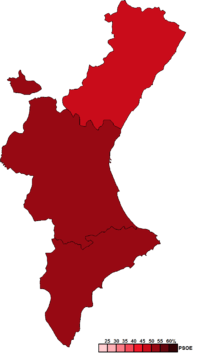1983 Valencian regional election
The 1983 Valencian regional election was held on Sunday, 8 May 1983, to elect the 1st Corts of the Valencian Community. All 89 seats in the Corts were up for election. The election was held simultaneously with regional elections in twelve other autonomous communities and local elections all throughout Spain.
| |||||||||||||||||||||||||||||||||
All 89 seats in the Corts Valencianes 45 seats needed for a majority | |||||||||||||||||||||||||||||||||
|---|---|---|---|---|---|---|---|---|---|---|---|---|---|---|---|---|---|---|---|---|---|---|---|---|---|---|---|---|---|---|---|---|---|
| Opinion polls | |||||||||||||||||||||||||||||||||
| Registered | 2,654,967 | ||||||||||||||||||||||||||||||||
| Turnout | 1,931,142 (72.7%) | ||||||||||||||||||||||||||||||||
| |||||||||||||||||||||||||||||||||
 Constituency results map for the Corts Valencianes | |||||||||||||||||||||||||||||||||
| |||||||||||||||||||||||||||||||||
The Spanish Socialist Workers' Party (PSOE) won the election with an absolute majority of 51 out of 89 seats and almost 1 million votes (51.4% of the vote). The People's Coalition, composed in the Valencian Community by the People's Alliance (AP), the People's Democratic Party (PDP), the Liberal Union and the Valencian Union (UV), became the second political force and the main opposition party in the Corts Valencianes with 32 seats. The Communist Party of Spain (PCE) managed to surpass the 5% regional threshold and entered the Corts with 6 seats, seeing a slight recovery from its results in the October 1982 general election.[1][2]
As a result of the election, regional PSOE leader Joan Lerma became the first democratically elected President of the Valencian Government.[3]
Overview
Electoral system
The Corts Valencianes were the devolved, unicameral legislature of the Valencian autonomous community, having legislative power in regional matters as defined by the Spanish Constitution and the Valencian Statute of Autonomy, as well as the ability to vote confidence in or withdraw it from a President of the Government.[4] Voting for the Corts was on the basis of universal suffrage, which comprised all nationals over eighteen, registered in the Valencian Community and in full enjoyment of their political rights.
The 89 members of the Corts Valencianes were elected using the D'Hondt method and a closed list proportional representation, with a threshold of 5 percent of valid votes—which included blank ballots—being applied regionally. Parties not reaching the threshold were not taken into consideration for seat distribution. Seats were allocated to constituencies, corresponding to the provinces of Alicante, Castellón and Valencia. Each constituency was allocated a fixed number of seats: 29 for Alicante, 25 for Castellón and 35 for Valencia.[4]
The electoral law provided that parties, federations, coalitions and groupings of electors were allowed to present lists of candidates. However, groupings of electors were required to secure the signature of at least 0.1 percent of the electors registered in the constituency for which they sought election—needing to secure, in any case, the signature of 500 electors—. Electors were barred from signing for more than one list of candidates. Concurrently, parties and federations intending to enter in coalition to take part jointly at an election were required to inform the relevant Electoral Commission within fifteen days of the election being called.[5]
Election date
The Council of the Valencian Country, in agreement with the Government of Spain, was required to call an election to the Corts Valencianes within from 1 February to 31 May 1983.[4]
Opinion polls
The table below lists voting intention estimates in reverse chronological order, showing the most recent first and using the dates when the survey fieldwork was done, as opposed to the date of publication. Where the fieldwork dates are unknown, the date of publication is given instead. The highest percentage figure in each polling survey is displayed with its background shaded in the leading party's colour. If a tie ensues, this is applied to the figures with the highest percentages. The "Lead" column on the right shows the percentage-point difference between the parties with the highest percentages in a given poll. When available, seat projections are also displayed below the voting estimates in a smaller font. 45 seats were required for an absolute majority in the Corts Valencianes.
| Polling firm/Commissioner | Fieldwork date | Sample size | Turnout | Lead | ||||
|---|---|---|---|---|---|---|---|---|
| 1983 regional election | 8 May 1983 | N/A | 72.7 | 51.4 51 |
31.9 32 |
7.5 6 |
1.9 0 |
19.5 |
| Sofemasa/El País[p 1][p 2] | 23–26 Apr 1983 | ? | ? | ? 62/67 |
? 23/26 |
– | – | ? |
| 1982 general election | 28 Oct 1982 | N/A | 84.0 | 53.1 54 |
29.1 29 |
4.6 0 |
2.5 0 |
24.0 |
Results
Overall
 | ||||||
| Parties and coalitions | Popular vote | Seats | ||||
|---|---|---|---|---|---|---|
| Votes | % | ±pp | Total | +/− | ||
| Spanish Socialist Workers' Party (PSOE) | 982,567 | 51.41 | n/a | 51 | n/a | |
| People's Coalition–Valencian Union (AP–PDP–UL–UV) | 609,519 | 31.89 | n/a | 32 | n/a | |
| Communist Party of the Valencian Country (PCE–PCPV) | 142,570 | 7.46 | n/a | 6 | n/a | |
| Valencian People's Union (UPV) | 58,712 | 3.07 | n/a | 0 | n/a | |
| Democratic and Social Centre (CDS) | 36,015 | 1.88 | n/a | 0 | n/a | |
| Liberal Democratic Party (PDL) | 29,788 | 1.56 | n/a | 0 | n/a | |
| Valencian Independent Organization (OIV) | 12,585 | 0.66 | n/a | 0 | n/a | |
| Workers' Socialist Party (PST) | 10,156 | 0.53 | n/a | 0 | n/a | |
| Valencian Nationalist Left (ENV–URV) | 7,623 | 0.40 | n/a | 0 | n/a | |
| Spanish Communist Workers' Party (PCOE) | 5,945 | 0.31 | n/a | 0 | n/a | |
| Popular Struggle Coalition (CLP) | 2,586 | 0.14 | n/a | 0 | n/a | |
| Blank ballots | 13,180 | 0.69 | n/a | |||
| Total | 1,911,246 | 89 | n/a | |||
| Valid votes | 1,911,246 | 98.97 | n/a | |||
| Invalid votes | 19,896 | 1.03 | n/a | |||
| Votes cast / turnout | 1,931,142 | 72.74 | n/a | |||
| Abstentions | 723,825 | 27.26 | n/a | |||
| Registered voters | 2,654,967 | |||||
| Sources[6][7][8] | ||||||
Aftermath
| Investiture | |||||
| Candidate | Ballot → | 6 June 1983 | |||
|---|---|---|---|---|---|
| Required majority → | 45 out of 89 | ||||
| Joan Lerma (PSOE) | Yes
|
51 / 89 |
|||
32 / 89 | |||||
Abstentions
|
6 / 89 | ||||
| Absentees | 0 / 89 | ||||
| José Galán (PCPV) | Yes
|
6 / 89 |
|||
83 / 89 | |||||
| Abstentions | 0 / 89 | ||||
| Absentees | 0 / 89 | ||||
| Sources[3][8] | |||||
References
- Opinion poll sources
- "Los socialistas pueden alcanzar los dos tercios del Parlamento autónomo". El País (in Spanish). 1 May 1983.
- "Ficha técnica de los sondeos". El País (in Spanish). 1 May 1983.
- Other
- "Apreciable recuperación de los comunistas". El País (in Spanish). 10 May 1983. Retrieved 11 December 2019.
- "Lerma mantendrá los actuales consejeros en el Gobierno de la Generalitat valenciana". El País (in Spanish). 12 May 1983. Retrieved 12 December 2019.
- "Joan Lerma, investido presidente de la Generalitat valenciana". El País (in Spanish). 23 June 1983. Retrieved 11 December 2019.
- "Statute of Autonomy of the Valencian Community of 1982". Organic Law No. 1 of 1 July 1982. Official State Gazette (in Spanish). Retrieved 17 March 2017.
- "Electoral Rules Decree of 1977". Royal Decree-Law No. 20 of 18 March 1977. Official State Gazette (in Spanish). Retrieved 27 December 2016.
- "Corts Valencianes election, 1983". www.datoselecciones.com (in Spanish). Election Data. Retrieved 30 September 2017.
- "Electoral Results. Electoral Data - Regional Election: 1983". www.cortsvalencianes.es (in Spanish). Corts Valencianes. Retrieved 29 November 2019.
- "Corts Valencianes elections since 1983". historiaelectoral.com (in Spanish). Electoral History. Retrieved 30 September 2017.

